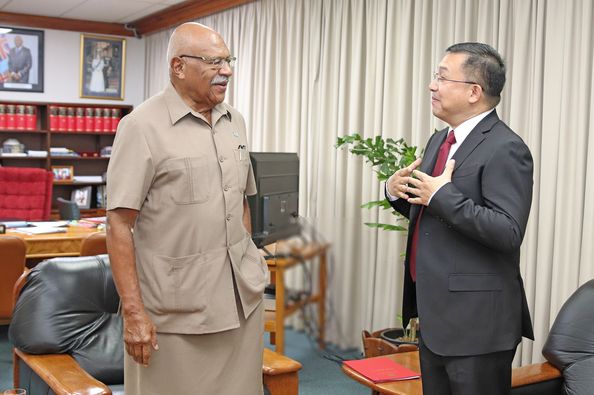China has accused outgoing Federated States of Micronesia (FSM) President David Panuelo for breaking serious political commitments he made to Beijing “multiple times”.
Chinese Ambassador to Fiji Zhou Jian said this during a media briefing in Suva last week where he said he was aware of a 13-page letter written by Panuelo.
“Frankly speaking, I am shocked at these ‘so called letters’,” the Chinese ambassador said when asked by the media to share his thoughts on the letter.
“In his letter, he broke the serious political commitment which he made to China multiple times.
“This seriously violates the one China principle, so blatantly violates its promise and commitment to another country.
“China firmly rejects any official communication between FSM and the Taiwan region in any form and firmly opposes any slander against Chinese diplomats.”
Ambassador Jian said China’s policies towards Pacific island countries (PICs) was based on equality, mutual respect and co-operation.
“We’ve never interfered into the internal affairs of other countries. If you look at the political change in some countries, the Chinese never derived the same because it is against our diplomatic philosophy and tradition.”
Ambassador Jian was responding to Panuelo’s letter to FSM leaders where he accused China of engaging in “political warfare” in the Pacific.
He also alleged that China was preparing to invade Taiwan, and had engaged in bribery, political interference and even direct threats to ensure that FSM remained neutral in the event of war.
Panuelo also claimed there was a potential agreement to switch FSM’s diplomatic recognition from China to Taiwan.
The FSM President’s letter in relation to China was not his first. Panuelo has a track record among world leaders of being exceptionally astute, open, and direct in his analysis of China’s behaviour and actions.
In March last year, he wrote to Solomon Islands Prime Minister Manasseh Sogavare and expressed concern over the China- Solomon Islands security deal.
On 20 May, 2022, he wrote to PICs leaders and outlined the implications of then-Chinese foreign minister Wang Yi’s trip through the Pacific.
PICs leaders later rejected the regional trade and security agreement Wang was pushing.
SOURCE: FIJI TIMES/PACNEWS














